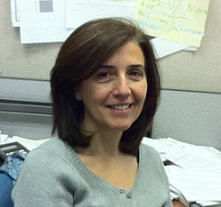Follow your passion, and success will follow.
Dr. Marta Catalfamo’s determination to follow her passion has taken her career around the world. Originally from Argentina, Dr. Catalfamo studied Biochemistry at the National University of Tucuman. She earned her Ph.D. in Biological Sciences at the Autonoma University of Barcelona, where she studied the role of T cells in the pathogenesis of autoimmune diseases in humans. After moving to the US, Dr. Catalfamo began her post-doctoral fellowship at the National Cancer Institute. There, her studies focused specifically on the biology of CD8 T cells and the mechanisms that CD8 T cells use to kill viral infected and tumorous cells. Towards the end of her fellowship, Dr. Catalfamo attended a lecture by Dr. Clifford Lane at the National Institute of Allergy and Infectious Diseases (NIAID). She heard the firsthand experiences of a patient living with HIV during the early HIV epidemic. The lecture sparked her interest in HIV and ignited the research question Dr. Catalfamo would focus on: how HIV alters the immune system causing immune activation leading to failure of viral control and elimination. Inspired by the lecture, she joined Dr. Lane’s Clinical and Molecular Retrovirology Section at the Laboratory of Immunoregulation as a Staff Scientist. Dr. Lane introduced her to HIV clinical research and gave her the opportunity to research the mechanisms by which chronic activation of CD4 and CD8 T cells contributes to an increased risk of developing non-AIDS defining illnesses in people living with HIV. Her research continued focusing on developing immunotherapies to restore the immune function of T cells to eliminate and control the virus.
After working as an Associate Scientist at NIAID, Dr. Catalfamo transitioned into academia, joining the Georgetown University School of Medicine, Department of Microbiology and Immunology as an Associate Professor in November 2016. Dr. Princy Kumar, then an EC member of the DC CFAR, supported her research endeavors and introduced her to the network and resources available at Georgetown and the DC CFAR.
Her current research explores why people with higher levels of immune activation have an increased risk of developing cardiovascular disease. Awarded an R01 on the impact of HIV-driven T cell immune activation in angiogenic CD8 T cell function, she continues to investigate the role of T cell activation in endothelial inflammation and cardiovascular risk and disease.
As the Associate Director of the Basic Sciences Core and Co-lead of the new Aging and Comorbidities Scientific Interest Group (SIG), she continually strives to contribute and collaborate with people around a common goal. The DC CFAR gave her the opportunity to train and support early-stage and new investigators, learn from community members, and collaborate with scientists from other areas of research. As the Co-Lead of the Aging and Comorbidities SIG, providing multidisciplinary perspectives is one of her top priorities. She said, "There are many comorbidities associated with immune activation during HIV infection. Understanding how HIV infection drives the risk of these diseases requires a multidisciplinary approach with a continuum of biomedical research expertise ranging from the most basic to translational research for the treatment and prevention. The SIG creates a framework to bring together researchers and community partners to discuss HIV, aging, and comorbidities in people living with HIV." As a newly tenured professor and co-Director of institutional training grant in Neuro-HIV at Georgetown University, Dr. Catalfamo plans to continue her efforts to end HIV and training next-generation scientists in the field of HIV research.


